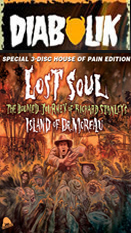
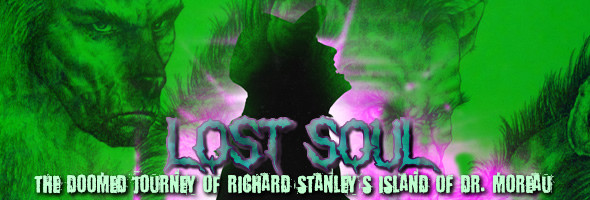
Color, 2014, 97m.
Directed by David Gregory
Severin (Blu-ray & DVD) (US R0 HD/NTSC) / WS (1.78:1) (16:9)


Color, 2014, 97m.
Directed by David Gregory
Severin (Blu-ray & DVD) (US R0 HD/NTSC) / WS (1.78:1) (16:9)
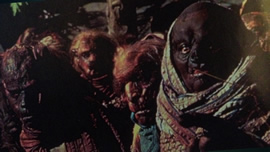
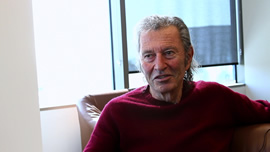 Already cemented as one of the most amazing making-of movie documentaries ever made, this outrageous odyssey takes a deep look at one of the most notorious chapters in Hollywood studio history: the production of 1996 version of The Island of Dr. Moreau. The project was initiated at New Line as the passion project of young South African-born director Richard Stanley, who made something of an indie splash in 1990 with the widely censored but acclaimed Hardware and ran into a wall with the nightmare distribution woes of his second film, Dust Devil. He seemed like the natural choice to bring H.G. Wells' controversial novel to the screen (following previous official adaptations in 1932 and 1977), but a combination of natural disasters, bureaucratic interference, Stanley's youthful naiveté, and star egos resulted in him getting booted once the production was underway and replaced by John Frankenheimer, producing a bizarre, disjointed, but undeniably fascinating shambles of a film that bears little connection to Stanley's vision apart from the locations and Stan Winston makeup effects.
Already cemented as one of the most amazing making-of movie documentaries ever made, this outrageous odyssey takes a deep look at one of the most notorious chapters in Hollywood studio history: the production of 1996 version of The Island of Dr. Moreau. The project was initiated at New Line as the passion project of young South African-born director Richard Stanley, who made something of an indie splash in 1990 with the widely censored but acclaimed Hardware and ran into a wall with the nightmare distribution woes of his second film, Dust Devil. He seemed like the natural choice to bring H.G. Wells' controversial novel to the screen (following previous official adaptations in 1932 and 1977), but a combination of natural disasters, bureaucratic interference, Stanley's youthful naiveté, and star egos resulted in him getting booted once the production was underway and replaced by John Frankenheimer, producing a bizarre, disjointed, but undeniably fascinating shambles of a film that bears little connection to Stanley's vision apart from the locations and Stan Winston makeup effects. 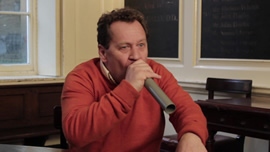 picture of an ordeal quite unlike anything else in film history. (Only Val Kilmer and, more oddly, David Thewlis are missing in action here.) The general thrust here sounds like other worthy documentaries about legendary sabotaged projects like Lost in La Mancha and Jodorowsky's Dune, but the details make all the difference here as we get accounts from makeup artists, executives, and actors about the madness they experienced, with Fairuza Balk offering a candid breakdown of her positive initial experiences with Stanley through her distraught attempts to escape from
picture of an ordeal quite unlike anything else in film history. (Only Val Kilmer and, more oddly, David Thewlis are missing in action here.) The general thrust here sounds like other worthy documentaries about legendary sabotaged projects like Lost in La Mancha and Jodorowsky's Dune, but the details make all the difference here as we get accounts from makeup artists, executives, and actors about the madness they experienced, with Fairuza Balk offering a candid breakdown of her positive initial experiences with Stanley through her distraught attempts to escape from 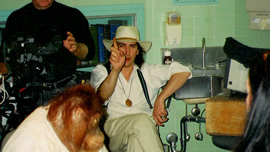 the shoot near Cairns in Australia. Also astonishing is the largely untold story told by actor Marco Hofschneider (Europa Europa), who was originally hired as Kilmer's mutated dog assistant M'Ling (complete with an opening scene reading The Tempest) only to have his part hacked away to an inexplicable background appearance. Northern Exposure star Rob Morrow also appears to cover his own early involvement, which led to his departure and a game of musical chairs with the leading roles that ended up with Kilmer and Thewlis in the parts we know now. Other participants include New Line founder Bob Shaye, New Line script reader and future director Tim Sullivan (2001 Maniacs), production artist Graham Humphreys (whose eye-popping designs for Stanley are some of the most eye-catching visual elements here), and loads more, coupled with great behind-the-scenes footage from the film's pre-production and even some great coverage of the tiny Nelson de la Rosa, whose eventual presence as Brando's "mini-me" companion is arguably the Frankenheimer film's greatest contribution to pop culture via Austin Powers and South Park. However, the majority of interview time understandably goes to Stanley, who spends the first portion covering his original vision for the film and his own relationship with the source material. Along the way he candidly assesses his own errors (like assuming having Brando in his pocket would protect him from the studio axe) and recalls the early disasters that really started the whole mess, namely the suicide of Brando's daughter, a devastating hurricane that submerged part of the sets, and the irrational behavior of Kilmer, who had been served with divorce papers and was becoming more difficult by the day. Oddly enough, as sympathetic as one is to the filmmaker through the entire story (including some wild tangents into witchcraft that have to be heard to be believed), it's also abundantly clear that even without the problematic actors, he would've been far better off taking this to European financiers than trying to tangle with the American studio
the shoot near Cairns in Australia. Also astonishing is the largely untold story told by actor Marco Hofschneider (Europa Europa), who was originally hired as Kilmer's mutated dog assistant M'Ling (complete with an opening scene reading The Tempest) only to have his part hacked away to an inexplicable background appearance. Northern Exposure star Rob Morrow also appears to cover his own early involvement, which led to his departure and a game of musical chairs with the leading roles that ended up with Kilmer and Thewlis in the parts we know now. Other participants include New Line founder Bob Shaye, New Line script reader and future director Tim Sullivan (2001 Maniacs), production artist Graham Humphreys (whose eye-popping designs for Stanley are some of the most eye-catching visual elements here), and loads more, coupled with great behind-the-scenes footage from the film's pre-production and even some great coverage of the tiny Nelson de la Rosa, whose eventual presence as Brando's "mini-me" companion is arguably the Frankenheimer film's greatest contribution to pop culture via Austin Powers and South Park. However, the majority of interview time understandably goes to Stanley, who spends the first portion covering his original vision for the film and his own relationship with the source material. Along the way he candidly assesses his own errors (like assuming having Brando in his pocket would protect him from the studio axe) and recalls the early disasters that really started the whole mess, namely the suicide of Brando's daughter, a devastating hurricane that submerged part of the sets, and the irrational behavior of Kilmer, who had been served with divorce papers and was becoming more difficult by the day. Oddly enough, as sympathetic as one is to the filmmaker through the entire story (including some wild tangents into witchcraft that have to be heard to be believed), it's also abundantly clear that even without the problematic actors, he would've been far better off taking this to European financiers than trying to tangle with the American studio 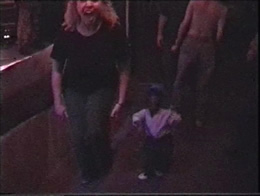 system.
system. 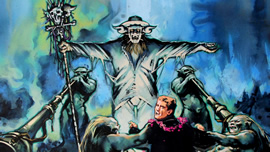 Lost Soul: The Doomed Journey of Richard Stanley's Island of Dr. Moreau was directed by Severin Films co-founder David Gregory, who previously helmed the stylish Plague Town and a segment of The Theatre Bizarre alongside Stanley, and produced by Gregory and a pair of other familiar names from that latter film, Carl Daft and John Cregan. You'll see quite a few other surprising names in the crew list, too, including editor Douglas Buck (Cutting Moments and the Sisters remake) and even an interview production credit to Combat Shock director Buddy Giovinazzo. The end result feels like a real labor of love with a fast, engaging pace and an incredible wealth and diversity of material, which also means there was plenty left over to mount a special edition released by Severin. In fact, there are a multitude of options out there including a DVD, a single-disc Blu-ray, and a three-disc "House of Pain" edition also offered via the company itself with some other optional bells and whistles like autographed posters and T-shirts. The main disc houses the feature itself (which looks excellent, as you'd expect for a recent HD-produced doc, and comes with optional English subtitles) along with the trailer plus a slew of substantial extras including six chucks of outtakes with Stanley (47 mins.), Hofschneider (16 mins. and all fascinating), Jim Sbardellati (just under 6 mins.), Graham "Grace" Walker (2 mins.), Graham Humphreys (1 mins.), and Hugh and Ollie (1 mins.), followed by a much more detailed and extensive look at Humphreys' concept art for the film (14 mins.) with Stanley providing great, detailed commentary about them in film order. It's actually a great little snapshot of how some highlights for his version might have played out. A vintage six-minute press interview with Frankenheimer is presented in its raw state with the filmmaker (chatty but looking a little cagey) discussing the production in politically astute terms, even making a valiant effort at explaining Kilmer's behavior and denying his most famous statement about the shoot. Cult film legend Barbara Steele turns up for a five-minute audio interview about her role as Moreau's fiancee, a role shown in home movies and described as a progression of her character from Piranha. The hilarious and astonishing "The Beast of Morbido" offers a nine-minute encapsulation of Stanley's appearance at Mexico's Morbido Film Festival in November of 2014 for a screening of Lost Soul, with former Stan Winston effects artist Bruce Spaulding Fuller turning Stanley into a wild "humanimal" to cavort at night in the
Lost Soul: The Doomed Journey of Richard Stanley's Island of Dr. Moreau was directed by Severin Films co-founder David Gregory, who previously helmed the stylish Plague Town and a segment of The Theatre Bizarre alongside Stanley, and produced by Gregory and a pair of other familiar names from that latter film, Carl Daft and John Cregan. You'll see quite a few other surprising names in the crew list, too, including editor Douglas Buck (Cutting Moments and the Sisters remake) and even an interview production credit to Combat Shock director Buddy Giovinazzo. The end result feels like a real labor of love with a fast, engaging pace and an incredible wealth and diversity of material, which also means there was plenty left over to mount a special edition released by Severin. In fact, there are a multitude of options out there including a DVD, a single-disc Blu-ray, and a three-disc "House of Pain" edition also offered via the company itself with some other optional bells and whistles like autographed posters and T-shirts. The main disc houses the feature itself (which looks excellent, as you'd expect for a recent HD-produced doc, and comes with optional English subtitles) along with the trailer plus a slew of substantial extras including six chucks of outtakes with Stanley (47 mins.), Hofschneider (16 mins. and all fascinating), Jim Sbardellati (just under 6 mins.), Graham "Grace" Walker (2 mins.), Graham Humphreys (1 mins.), and Hugh and Ollie (1 mins.), followed by a much more detailed and extensive look at Humphreys' concept art for the film (14 mins.) with Stanley providing great, detailed commentary about them in film order. It's actually a great little snapshot of how some highlights for his version might have played out. A vintage six-minute press interview with Frankenheimer is presented in its raw state with the filmmaker (chatty but looking a little cagey) discussing the production in politically astute terms, even making a valiant effort at explaining Kilmer's behavior and denying his most famous statement about the shoot. Cult film legend Barbara Steele turns up for a five-minute audio interview about her role as Moreau's fiancee, a role shown in home movies and described as a progression of her character from Piranha. The hilarious and astonishing "The Beast of Morbido" offers a nine-minute encapsulation of Stanley's appearance at Mexico's Morbido Film Festival in November of 2014 for a screening of Lost Soul, with former Stan Winston effects artist Bruce Spaulding Fuller turning Stanley into a wild "humanimal" to cavort at night in the 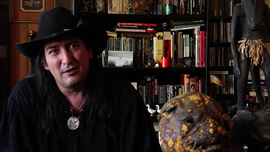 streets and appear in character for a Q&A, complete with a "house of pain" chant at the end.
streets and appear in character for a Q&A, complete with a "house of pain" chant at the end. 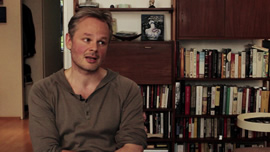 (Watch for an amused Gregory standing on the sidelines, too.) In "The Hunt for the Compound," we get a six-minute at an attempt to get back to the Australian location where Moreau's house was built, now destroyed and completely overgrown, and "Boar Man Diary" is a 15-minute reading of journal highlights from a candid account on the ground of the tumultuous production.
(Watch for an amused Gregory standing on the sidelines, too.) In "The Hunt for the Compound," we get a six-minute at an attempt to get back to the Australian location where Moreau's house was built, now destroyed and completely overgrown, and "Boar Man Diary" is a 15-minute reading of journal highlights from a candid account on the ground of the tumultuous production. ![]()